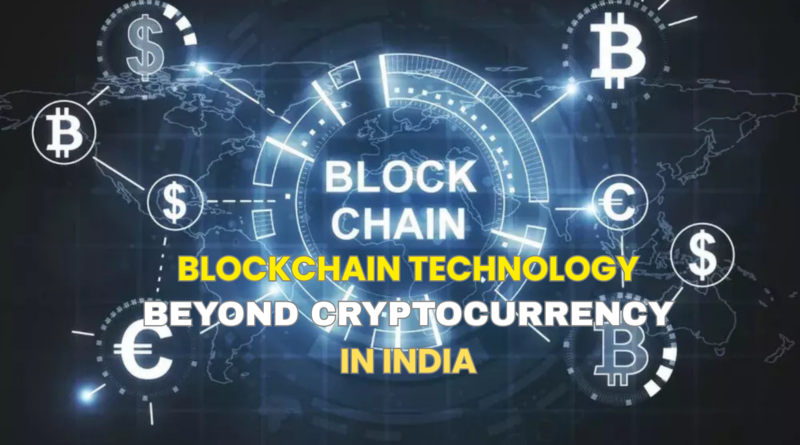BLOCKCHAIN TECHNOLOGY BEYOND CRYPTOCURRENCY IN INDIA
When people hear the word blockchain, most of them immediately think of cryptocurrency like Bitcoin or Ethereum. While it is true that blockchain is the foundation of these digital currencies, its uses go far beyond just money. In India, blockchain technology is slowly but steadily becoming a tool that can change many industries such as banking, healthcare, agriculture, education, and even governance.
Blockchain is a digital ledger or record-keeping system. Think of it like a notebook where every transaction is written and stored permanently. The difference is that this notebook is not kept in one place. Instead, it is shared across thousands of computers connected through the internet. Once information is entered, it cannot be changed or erased. This makes blockchain very secure, transparent, and trustworthy.
Why Blockchain is Important for India
India is a country with a large population, diverse economy, and many challenges related to corruption, lack of transparency, and inefficiency. Blockchain can help solve some of these problems by creating systems that are open, tamper-proof, and easy to track. With the government promoting “Digital India,” blockchain has the potential to bring trust and speed to many processes.
Uses of Blockchain Beyond Cryptocurrency in India
1. Banking and Finance
Apart from cryptocurrencies, blockchain can be used by banks to speed up payments, reduce fraud, and improve customer services. For example, sending money across countries usually takes a few days and involves extra charges. With blockchain-based systems, the process can be done in minutes with more security. Banks in India like ICICI and Yes Bank have already tested blockchain for trade finance and payments.
2. Supply Chain Management
India’s economy depends a lot on agriculture and manufacturing. However, tracking products from farms or factories to consumers is often difficult. With blockchain, every step of the journey can be recorded. For example, when a farmer sells mangoes, the buyer can see where they were grown, when they were shipped, and how fresh they are. This not only improves quality but also prevents cheating and fake products.
3. Land and Property Records
One of the biggest problems in India is land ownership disputes. Many people face issues with fake documents or unclear property records. Blockchain can solve this by creating a digital land registry that cannot be changed. States like Telangana and Andhra Pradesh are already testing blockchain for land record management to make buying and selling property more transparent.
4. Healthcare
In healthcare, patient data is often spread across different hospitals and clinics. This causes delays and sometimes even wrong treatments. With blockchain, all medical records can be stored safely and accessed by authorized doctors only. It also prevents misuse of data and ensures privacy. During the COVID-19 pandemic, blockchain was even suggested for vaccine tracking.
5. Education and Certificates
Fake degrees and certificates are a big problem in India. Blockchain can help by storing all educational certificates in a secure and verifiable digital format. Employers can then quickly check if a candidate’s qualifications are real. Some Indian universities have already started experimenting with blockchain-based certificates.
6. Governance and Public Services
Blockchain can bring transparency to government projects. For example, it can be used in welfare schemes to make sure benefits reach the right people without corruption. It can also be used in voting systems to make elections more secure and tamper-proof.
7. Agriculture
Farmers often face problems with middlemen, unfair prices, and lack of access to credit. Blockchain can create direct links between farmers and consumers, ensuring fair payments. It can also help track subsidies and crop insurance claims without delays.
Challenges in Using Blockchain in India
While blockchain has many advantages, there are also challenges:
Lack of awareness – Many people do not fully understand blockchain.
High cost of technology – Setting up blockchain systems requires money and skilled professionals.
Legal and regulatory issues – India does not yet have clear laws for blockchain uses beyond cryptocurrency.
Scalability – Handling millions of transactions at once is still a challenge for blockchain systems.
Government and Industry Efforts
The Indian government has shown interest in blockchain. The Ministry of Electronics and Information Technology (MeitY) has even created a “National Blockchain Strategy” to guide its use. Several states, including Karnataka, Telangana, and Maharashtra, are testing blockchain projects for land records, agriculture, and governance. At the same time, private companies and startups are also building blockchain-based solutions for industries like healthcare, education, and logistics.
Future of Blockchain in India
The future of blockchain in India looks promising. As more people become aware of its benefits and as the government sets clear rules, blockchain could become a backbone of the digital economy. With India’s push for “Digital India” and “Make in India,” blockchain can bring transparency, efficiency, and trust to many systems that currently face corruption and delays.




